

Vol 4. No. 1. “The Pursuit of Happiness: The Root of America’s Civil Ethic”(WPS Presidential Address, 2005) Dr.
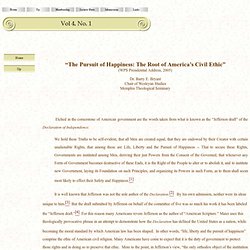
Barry E. Bryant Chair of Wesleyan Studies Memphis Theological Seminary. Principle 8. Life and the Pursuit of Happiness. A Principle of The Traditional American Philosophy 8.
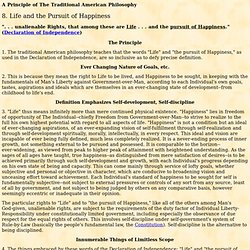
Life and the Pursuit of Happiness. Because the Past is the Present, and the Future too. By Carol V.
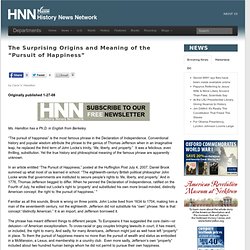
Hamilton Originally published 1-27-08. Declaration of Independence - Transcript. The Declaration of Independence: A Transcription IN CONGRESS, July 4, 1776.
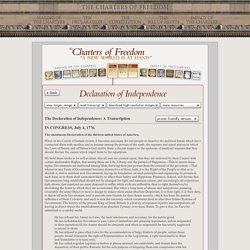
The unanimous Declaration of the thirteen united States of America, When in the Course of human events, it becomes necessary for one people to dissolve the political bands which have connected them with another, and to assume among the powers of the earth, the separate and equal station to which the Laws of Nature and of Nature's God entitle them, a decent respect to the opinions of mankind requires that they should declare the causes which impel them to the separation. We hold these truths to be self-evident, that all men are created equal, that they are endowed by their Creator with certain unalienable Rights, that among these are Life, Liberty and the pursuit of Happiness. He has refused his Assent to Laws, the most wholesome and necessary for the public good.
Nor have We been wanting in attentions to our Brittish brethren. The Dangers of Same-Sex 'Marriage' What's Wrong with That?
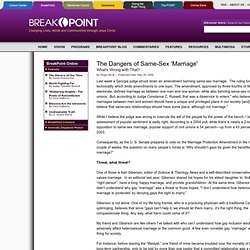
By Regis Nicoll|Published Date: May 26, 2006 Last week a judge struck down an amendment banning same-sex marriage. The ruling turned on a technicality which limits amendments to one topic. The amendment, approved by three-fourths of the State electorate, defined marriage as between one man and one woman, while also banning same-sex civil unions. But, according to Judge Constance C. While I believe the judge was wrong to overrule the will of the people by the power of the bench, I believe his assessment of popular sentiment is sadly right.
Consequently, as the U. Threat, what threat? One of those is Karl Giberson, editor of Science & Theology News and a self-described conservative who values marriage. Giberson is not alone. My friend and Giberson are like others I’ve talked with who can’t understand how gay inclusion would adversely affect heterosexual marriage or the common good. First things first Consider Jesus’s conversation with adulterous woman. Genetic robots? Article. “The apt and cheerful conversation of man with woman is the chief and noblest purpose of marriage,” wrote John Milton.
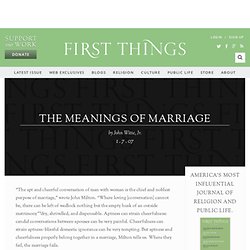
“Where loving [conversation] cannot be, there can be left of wedlock nothing but the empty husk of an outside matrimony””dry, shrivelled, and dispensable. Aptness can strain cheerfulness: candid conversations between spouses can be very painful. Cheerfulness can strain aptness: blissful domestic ignorance can be very tempting. But aptness and cheerfulness properly belong together in a marriage, Milton tells us. Where they fail, the marriage fails. An apt and cheerful conversation about marriage must be part of our dialogue today. To be “apt,” our conversation cannot wax nostalgic about a prior golden age of marriage and the family, nor wax myopic about modern ideals of liberty, privacy, and autonomy. To be “cheerful,” our conversation must proceed with the faith that the crisis of modern American marriage and family life can be overcome.
Of the Unity and Indissolubility of Marriage. At the General Audience in St Peter's Square on 5 September, attended by more than 20,000 people, Pope John Paul II gave the following address. 1.
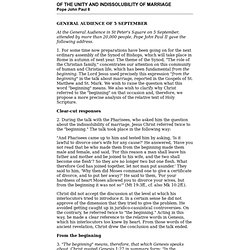
For some time now preparations have been going on for the next ordinary assembly of the Synod of Bishops, which will take place in Rome in autumn of next year. The theme of the Synod, "The role of the Christian family," concentrates our attention on this community of human and Christian life, which has been fundamental from the beginning. The Lord Jesus used precisely this expression "from the beginning" in the talk about marriage, reported in the Gospels of St. Matthew and St. Clear-cut responses 2. "And Pharisees came up to him and tested him by asking, 'Is it lawful to divorce one's wife for any cause? ' Defense of Marriage.